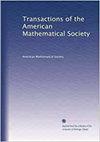论奇异函数的rôle将概率符号扩展到它的最一般类
IF 1.2
2区 数学
Q1 MATHEMATICS
引用次数: 0
摘要
概率符号是与随机过程的一维边际相对应的特征函数的右侧导数。这个目标,只要导数存在,就提供了关于随机过程的关键信息。对于lsamvy过程,可以得到特征指数,而(富)Feller过程的符号与伪微分算子理论中众所周知的经典符号一致。撇开这些类不讲,符号仍然存在的最一般的一类过程是l本文章由计算机程序翻译,如有差异,请以英文原文为准。
On the rôle of singular functions in extending the probabilistic symbol to its most general class
The probabilistic symbol is the right-hand side derivative of the characteristic functions corresponding to the one-dimensional marginals of a stochastic process. This object, as long as the derivative exists, provides crucial information concerning the stochastic process. For a Lévy process, one obtains the characteristic exponent while the symbol of a (rich) Feller process coincides with the classical symbol which is well known from the theory of pseudodifferential operators. Leaving these classes behind, the most general class of processes for which the symbol still exists are Lévy-type processes. It has been an open question, whether further generalizations are possible within the framework of Markov processes. We answer this question in the present article: within the class of Hunt semimartingales, Lévy-type processes are exactly those for which the probabilistic symbol exists. Leaving Hunt behind, one can construct processes admitting a symbol. However, we show, that the applicability of the symbol might be lost for these processes. Surprisingly, in our proofs the upper and lower Dini derivatives corresponding to certain singular functions play an important rôle.
求助全文
通过发布文献求助,成功后即可免费获取论文全文。
去求助
来源期刊
CiteScore
2.30
自引率
7.70%
发文量
171
审稿时长
3-6 weeks
期刊介绍:
All articles submitted to this journal are peer-reviewed. The AMS has a single blind peer-review process in which the reviewers know who the authors of the manuscript are, but the authors do not have access to the information on who the peer reviewers are.
This journal is devoted to research articles in all areas of pure and applied mathematics. To be published in the Transactions, a paper must be correct, new, and significant. Further, it must be well written and of interest to a substantial number of mathematicians. Piecemeal results, such as an inconclusive step toward an unproved major theorem or a minor variation on a known result, are in general not acceptable for publication. Papers of less than 15 printed pages that meet the above criteria should be submitted to the Proceedings of the American Mathematical Society. Published pages are the same size as those generated in the style files provided for AMS-LaTeX.

 求助内容:
求助内容: 应助结果提醒方式:
应助结果提醒方式:


